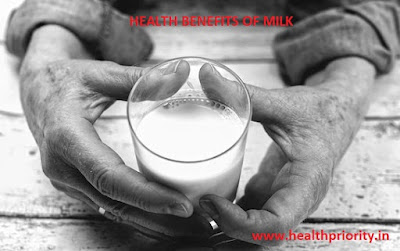Milk is a nutrient-dense food that has been a staple in many diets for centuries. It is a rich source of calcium, vitamin D, and other essential nutrients that can provide many health benefits for people of all ages.

One of the most well-known health benefits of milk is its ability to promote strong bones and teeth. Milk is an excellent source of calcium, which is an essential mineral for the development and maintenance of healthy bones and teeth. Calcium is also important for muscle function, nerve function and hormone regulation. Regular consumption of milk can help to prevent osteoporosis, a condition that can cause bones to become weak and brittle, particularly in older adults.
In addition to calcium, milk is also a good source of vitamin D. Vitamin D is essential for the body to absorb and use calcium effectively, which is why it is often referred to as the "sunshine vitamin". Low levels of vitamin D can lead to a host of health problems, including osteoporosis and rickets, which is why it is important to get enough of this nutrient. Milk is one of the few foods that naturally contain vitamin D, making it a great choice for those who may not get enough of this nutrient from other sources.

Milk is also a good source of protein, which is an essential nutrient that helps to build and repair muscle tissue. This is particularly important for athletes and those who engage in regular exercise, as protein is essential for muscle recovery and growth. Milk contains high-quality protein, which makes it an excellent choice for people looking to increase their protein intake.
Milk is also a good source of other essential nutrients such as potassium, phosphorous, and vitamin B12. Potassium helps to regulate fluid balance and blood pressure, while phosphorous plays an essential role in the formation of bones and teeth. Vitamin B12 is essential for the normal functioning of the nervous system, as well as for the formation of red blood cells.

Consuming milk and other dairy products has been associated with a lower risk of cardiovascular disease. Research suggests that the calcium, potassium, and other nutrients in milk can help to lower blood pressure and reduce the risk of heart disease.
Another potential benefit of milk is its ability to aid in weight management. Milk contains a mix of carbohydrates, protein and fat that can help to make you feel full, which can help to reduce overall calorie intake and promote weight loss.
Overall, milk is an incredibly versatile and nutritious food that can provide a wide range of health benefits. Whether you choose to drink it plain, as a component in a smoothie or used it as an ingredient, it can be a great addition to your diet. As with any food it's always important to be mindful of portion size and be aware of any dietary restrictions such as lactose intolerance.

In conclusion, milk is a nutrient-dense food that can provide many health benefits for people of all ages. Whether you're looking to build strong bones and teeth, increase your protein intake, or lower your risk of heart disease, milk is a great choice. By including milk and other dairy products in your diet, you can ensure that you're getting the essential nutrients you need to stay healthy and strong.

ConversionConversion EmoticonEmoticon